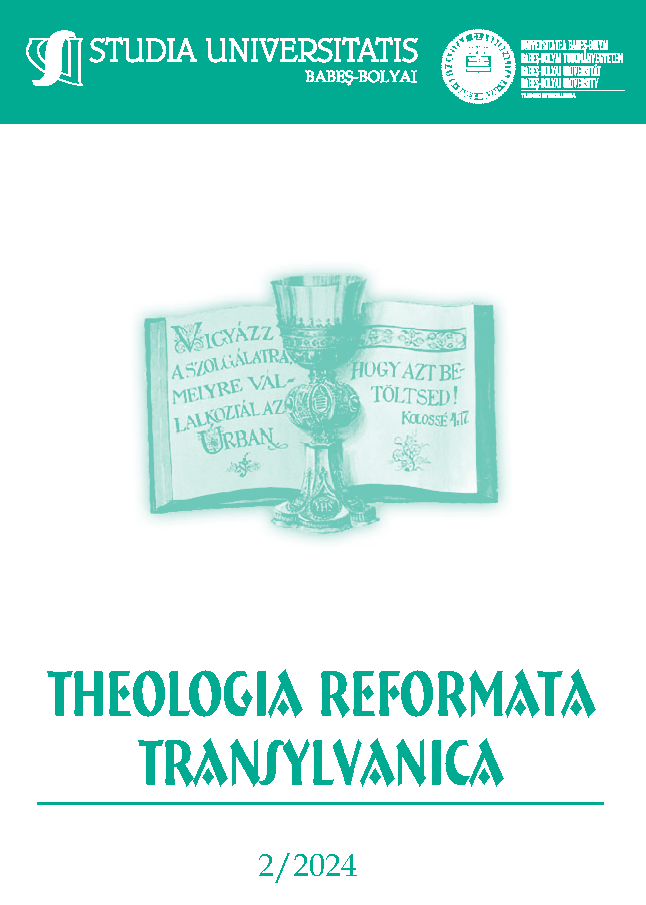Lehet-e vasárnap vadászni? Szabályok vasárnapra
DOI:
https://doi.org/10.24193/subbtref.69.2.09Keywords:
Ferenc Balogh, Lord’s Day Observance Society, Sunday observance, Evangelical Protestant journal, bank holiday, SundayAbstract
Is Hunting allowed on Sundays? Rules for the Seventh Day. The present study is part of a longer research project which aims at presenting the international movement for the sanctification of Sunday between 1875 and 1878 in the light of the periodical Evangyéliomi Protestáns Lap (EPL), founded and edited between 1875 and 1878 by Ferenc Balogh (1836–1913), a Reformed church and dogmatic historian and professor of church history in Debrecen, supplemented by domestic news from the periodicals Protestáns Egyházi és Iskolai Lap (PEIL) and Erdélyi Protestáns Közlöny (EPL). Church associations, tenders, religious and secular newsletters, publications and conferences played a major role in the international struggle for a Sunday off. This is how the International Sunday Movement came into being. The professor from Debrecen also supported it and kept the issue of Sunday celebration on the agenda with his Evangyéliomi Protestáns Lap. The issue was not only examined from an ecclesiastical point of view at the time, but its social and health implications were also pointed out. The issue of Sunday rest was of great interest. The problem is not a recent one, but the transformation of economic life has brought the issue to the fore more strongly. Most of the problematic Sunday working has come from the railways, industry, and commerce, with little mention of agriculture.
In this paper, we examine what church life was like on Sundays, what kinds of work and activities were banned by church and piety movements at home and abroad, and what role was played by the example and personal responsibility of the leading classes. Attention is drawn to specific phenomena that seem contradictory to people today such as the fact that hunting was forbidden on Sundays, but not horse riding and exhibitions. We will show how the time of worship was protected, how Sunday trips, excursions, visits to museums, galleries, and public gardens were judged, and what the movement expected of the state. What were the practical consequences of Sunday drinking and what were the counter-effects of Sunday bans.
References
1868. évi LIII. törvénycikk a törvényesen bevett keresztyén vallásfelekezetek viszonosságáról https://net.jogtar.hu/ezer-ev-torveny?docid=86800053.TV&searchUrl=/ezer-ev-torvenyei%3Fpagenum%3D28 (utolsó megtekintés dátuma: 2021. április 7.).
1879. évi XL. törvénycikk a magyar büntető törvénykönyv a kihágásokról. https://net.jogtar.hu/ezer-ev-torveny?docid=87900040.TV (utolsó megtekintés dátuma: 2021. június 29.).
BÍRÓ SÁNDOR – BUCSAY MIHÁLY – TÓTH ENDRE – VARGA ZOLTÁN (1949): A Magyar Református Egyház története. Budapest, Kossuth Könyvkiadó.
CSÁKY György (1890): Az ünnepi és vasárnapi munkaszünet. Napi kérdés. Budapest.
DANKÓ Imre (1991): A magyar vásárok néprajza, In: Domonkos Ottó (főszerk.): Magyar néprajz III. Kézművesség. Budapest, Akadémiai Kiadó.
Dunamelléki Református Egyházkerület jegyzőkönyve 1876. június 13. https://library.hungaricana.hu/hu/view/ReformatusJegyzokonyvek_Egyhazkerulet_Dunamelleki_1875_1879/?pg=0&layout=s (utolsó megtekintés dátuma: 2021. április 7.).
Erdélyi Protestáns Közlöny 1871, 1875–1878.
Evangyéliomi Protestáns Lap 1875–1878.
FORGÁCS Gyula (1925): A belmisszió és a cura pastoralis kézikönyve című művében. Budapest, Magyar Református Egyház.
GRANASZTÓI Péter (2000): Munkaidő, szabadidő, szórakozás. A társadalmi idők átalakulása a 19. században és a 20. század első felében. Fejős Zoltán (szerk.): A megfoghatatlan idő. Tabula könyvek 2. Budapest, Néprajzi Múzeum.
GYÁNI Gábor (1998): Az utca és szalon. A társadalmi térhasználat Budapesten (1870–1940). Budapest, Új Mandátum Könyvkiadó.
HECKMANN, Friedrich (1986): Arbeitszeit und Sonntagsruhe: Stellungnahmen zur Sonntagsarbeit als Beiträge kirchlicher Sozialkritik im 19. Jh. Essen, Verlag Die Blaue Eule.
KOVÁCS Ábrahám (2010): Hitvédelem és egyháziasság: a debreceni új ortodoxia vitája a liberális teológiával. Budapest, Magyar Vallástudományi Társaság – L’Harmattan.
(2016): Balogh Ferenc professzor edinburghi naplója. Budapest, L’Harmattan.
(2018): New Reformation in Debrecen? Church-Reviving Activity of the Peter Juhász Méliusz’ Later Follower – Ferenc Balogh (Debrecen’s New Orthodoxy as a New Reformation) | Újreformáció Debrecenben? Méliusz Juhász Péter kései utódjának, Balogh Ferencnek egyház-megújító munkássága (a debreceni újortodoxia mint újreformáció), In: Historia Ecclesiastica. IX. 2. 105–118.
(2019): Is Christ Proclaimed to Christians? The Impact of Scottish Evangelicalism on Hungarian Theology, Piety, and Praxis (1841–1945), In: Perichoresis. 17. 4. 111–131.
(2021) The Impact of Scottish Peregrination on the History of Education: From Darwin to Anglo-Saxon Pedagogy / A skót peregrináció művelődéstörténeti hatása: Darwintól az angolszász pedagógiáig, In: Historia Ecclesiastica. 2021/2. 284–294.
(2022): The Development of Hungarian Traditional Theology | Die Entstehung der ungarischen traditionellen Theologie, In: Journal for the History of Modern Theology. 29. 1. 23–44.
KOVÁCS Teofil (2021): Balogh Ferenc és a Vasárnap Megszentelése Mozgalom az Evangyéliomi Protestáns Lap tükrében, In: Csorba Dávid – Szatmári Emília (szerk.): „… Tanácsaid hűség és igazság”. Tisztelgő írások Dienes Dénes professzor úr 65. születésnapjára. Budapest, KRE Egyház és Társadalom Kutatóintézetének Reformáció Öröksége Műhelye, Hittudományi Kar Egyháztörténeti Kutatóintézet, Sárospatak, TiREk. 139–154.
[megjelenés előtt]: Ferenc Balogh and the Movement for the Observation of the Sundays, the Lord’s Day in the Light of Evangyéliomi Protestáns Lap, In: Evangelical Protestant Journal Part II.
LATHION, Valérie (2007): Un Dimanche pour Dieu ou pour l’homme? Une croisade philanthropique et religieuse pour la dèfense du dimanche chrètien. Modèles et pratiques aux XIXe et dèbut du XXe siècles. Genève, Universitè de Genève.
MÁRKUS Mihály (1983): Teológiai irányzatok, In: Bartha Tibor – Makkai László (főszerk.): Studia et ecclesiastica V. Tanulmányok a magyarországi református egyház 1867 és 1978 közötti történetéből. Budapest: MREZS sajtóosztálya. 155–198.
ÖTVÖS László (1997): Balogh Ferenc életműve (1836–1913). Debrecen – Budapest, Lux – Református Zsinati Iroda Tanulmányi Osztálya.
Protestáns Egyházi és Iskolai Lap 1875–1878.
SZÁNTÓ Konrád (1985): A katolikus egyház története II. Budapest, Ecclesia.
Szent László Király Dekrétomainak Első Könyve. 16. Fejezet a vasárnap megszegéséről. https://net.jogtar.hu/ezer-ev-torveny?docid=07700016.TV&searchUrl=/ezer-ev-torvenye (utolsó megtekintés dátuma: 2021. április 7.).
ZOVÁNYI Jenő (1977): Magyar protestáns egyháztörténeti lexikon. Budapest, MREZS Sajtóosztálya.
Downloads
Published
How to Cite
Issue
Section
License
Copyright (c) 2024 Studia Universitatis Babeș-Bolyai Theologia Reformata Transylvanica

This work is licensed under a Creative Commons Attribution-NonCommercial-NoDerivatives 4.0 International License.



